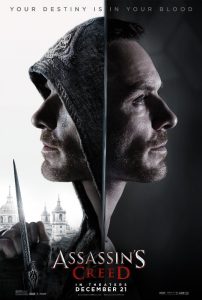 Assassin’s Creed was a game with an incredible premise. Using an sfnal device called The Animus, you could connect yourself to display monitors and relive the genetic memories of your ancestors, with an audience of observers along for the ride. This was a tool to tell the story of a war down through the ages between the Knights Templar (on the side of order, thoroughly lawful evil) and the Assassins (on the side of freedom, thoroughly chaotic neutral) to determine the fate of humankind. See, there’s this differently sfnal device called the Apple of Eden which nobody seems to exactly know how it works or what it does, but which everyone agrees will allow their side to win once and for all.
Assassin’s Creed was a game with an incredible premise. Using an sfnal device called The Animus, you could connect yourself to display monitors and relive the genetic memories of your ancestors, with an audience of observers along for the ride. This was a tool to tell the story of a war down through the ages between the Knights Templar (on the side of order, thoroughly lawful evil) and the Assassins (on the side of freedom, thoroughly chaotic neutral) to determine the fate of humankind. See, there’s this differently sfnal device called the Apple of Eden which nobody seems to exactly know how it works or what it does, but which everyone agrees will allow their side to win once and for all.
It was, unfortunately, an incredibly flawed game in execution, but both the basic premise and the underlying modern and historical parallel stories that premise enabled were not among the problems the game faced. In the meantime, that series has blossomed into some dozen or so games now, the first third of which I’ve played.
Enter last month, in which a movie based on that series was released. Which makes sense! You have a pre-built plot that contains lots of lavish historical sets and an interesting conflict, not to mention all kinds of cool parkour and medieval weapons combat. What’s not to like? Only… I mean, it wasn’t bad. Those things I said about how rich the premise and conflict are, they are true and cannot just be erased unless you made a movie that was actually unrelated to anything the games had done. And they did not, this is definitely an Assassin’s Creed movie.
At the same time, the plot fell apart to such a drastic degree in the final act that I don’t actually know what character decisions were made or how I should feel about them, even though up until then I had liked the two main characters (the Assassin descendant and the Templar scientist) and their developed relationship. Plus, the lush historical settings? Were instead consistently crowded with so much dust and smoke that you couldn’t really sit back and enjoy them. I did not expect anything so immersive as a 60 hour game can provide, but, talk about missing the point. Especially since the historical setting and timeline (1490s Spain) are both unaddressed by the games.
I guess what I expect is that any potential sequel will fix all of the niggling flaws and turn into something brilliant, just like the second game did. The parallels are just too strong to ignore!
 I’m in a weird position here, in that I’ve never played an episodic game before. The chapters are not terribly long, but they’re long enough that the full game seems like it will turn out to be incredibly long, plus also I’m so bad at reviewing partial games anyway. Not to say I expect to stop playing Life Is Strange! But things happen sometimes, and the part where I opted to take a break between chapters is, if not telling, at least cautionary.
I’m in a weird position here, in that I’ve never played an episodic game before. The chapters are not terribly long, but they’re long enough that the full game seems like it will turn out to be incredibly long, plus also I’m so bad at reviewing partial games anyway. Not to say I expect to stop playing Life Is Strange! But things happen sometimes, and the part where I opted to take a break between chapters is, if not telling, at least cautionary.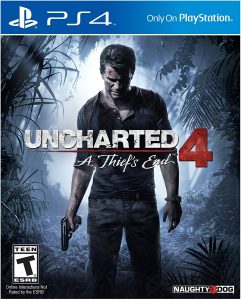 First completed video game in ages! Moving and getting married are hard, distracting work. Anyway, knowledge of this game’s release was exciting, because I’ve played the rest of the series in part as a bonding experience with my father. Then it took long enough post-release for me to get him to my house[1] that I probably should not have pre-ordered after all? Whatever, the price is only like $20 less even now.
First completed video game in ages! Moving and getting married are hard, distracting work. Anyway, knowledge of this game’s release was exciting, because I’ve played the rest of the series in part as a bonding experience with my father. Then it took long enough post-release for me to get him to my house[1] that I probably should not have pre-ordered after all? Whatever, the price is only like $20 less even now.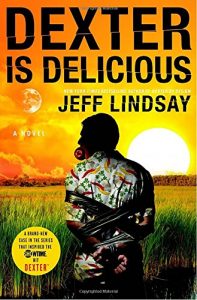 Apparently, the last Dexter book I read was over five years ago, when
Apparently, the last Dexter book I read was over five years ago, when 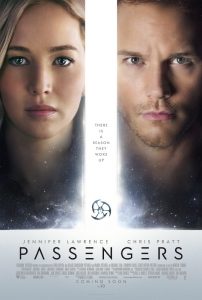 It is functionally impossible to really talk about this movie without massive spoilers, because what the movie is actually about requires knowledge of character actions and motivations. This is… problematic, since spoilers suck. So, I’ll fill in the next paragraph with some kind of thumbnail thing, and put in a cut (that doesn’t work everywhere), and after that, you should probably have watched it first to go any further. Or, if you don’t care, that’s your lookout.
It is functionally impossible to really talk about this movie without massive spoilers, because what the movie is actually about requires knowledge of character actions and motivations. This is… problematic, since spoilers suck. So, I’ll fill in the next paragraph with some kind of thumbnail thing, and put in a cut (that doesn’t work everywhere), and after that, you should probably have watched it first to go any further. Or, if you don’t care, that’s your lookout.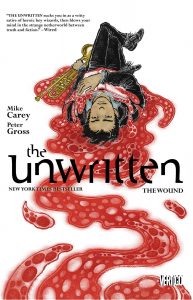 To actually review this, I need to go back and read
To actually review this, I need to go back and read  This is weird. First of all, yes, I saw
This is weird. First of all, yes, I saw 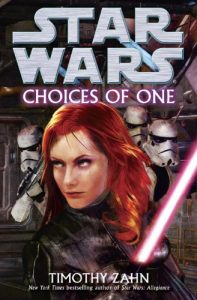 It’s the day after a big Star Wars release, so naturally I have a Star Wars review, about a story set in the early days surrounding the original movie, just like you’d expect me to have. Oh, wait, haha no, I haven’t actually gone to see any movie yet. Probably later this weekend? But my schedule, my wife’s schedule, and sellouts to places that have assigned seats conspired to keep me away last night. Even less likely than that, I wasn’t really thinking about this being release weekend when I picked up
It’s the day after a big Star Wars release, so naturally I have a Star Wars review, about a story set in the early days surrounding the original movie, just like you’d expect me to have. Oh, wait, haha no, I haven’t actually gone to see any movie yet. Probably later this weekend? But my schedule, my wife’s schedule, and sellouts to places that have assigned seats conspired to keep me away last night. Even less likely than that, I wasn’t really thinking about this being release weekend when I picked up 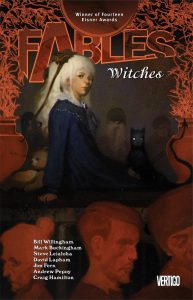 Moving: awesome for getting to live in a place you like better than the previous place you lived, but terrible for not falling way way behind on book series that you are reading. Case in point: The new Fables collection picks up right after they banded together to save all of creation that had been threatened by developments from the side series about Jack Horner, and that is not a record of what had actually been going on in the main continuity, which means they are resuming a plotline I last read about three years ago. Awesome.
Moving: awesome for getting to live in a place you like better than the previous place you lived, but terrible for not falling way way behind on book series that you are reading. Case in point: The new Fables collection picks up right after they banded together to save all of creation that had been threatened by developments from the side series about Jack Horner, and that is not a record of what had actually been going on in the main continuity, which means they are resuming a plotline I last read about three years ago. Awesome.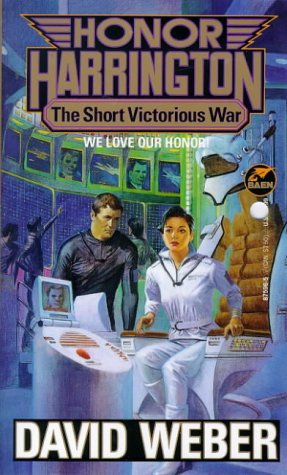 It’s been a while since I’ve
It’s been a while since I’ve